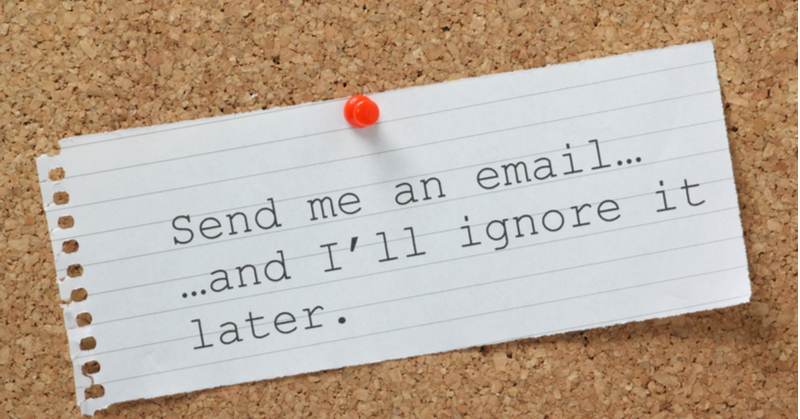Recently, I was in a video meeting with someone who showed me their email inbox, and I hope I hid my shock when I saw (name withheld to protect this person) had 18,872 unread emails in their inbox! Afterward, I reached out to some friends and colleagues and, based on these completely unscientific conversations, came up with this hypothesis.
In terms of inbox mismanagement, there are three types of people in the world.
The Avoider is a person who just doesn't want to deal with their inbox. They scan through emails to find the "important" emails, but simply ignore anything that doesn't jump out at them. When the avoider sees an email that might be important (based on the sender, subject or preview), they open the email and read it. However, they may or may not respond or take action depending on their self-identified priorities at that time. So, emails often sit in an inbox that is a hodgepodge of both read and unread emails.
The Optimist is a person who has the best of intentions and truly means it when they assure you they will get their email caught up by the end of the (pick one - day, week, month, year). The optimist sees the volume of emails and understands the importance of managing email to their business success, but either doesn't have a strategy to create order from the inbox chaos or is simply unable to move from talking to completion. The Optimist may have a lot of emails, but when you start to look, you can see some semblance of order where they have tried to organize the emails, but just never finished.
The OCD-er is a person who can't stand to see those dreaded bold emails indicating they haven't been read and actually gets stressed when they see any numbers showing even a single email that hasn't been read in any folder - including the deleted items folder. In fact, the OCD-er really wants no unread emails AND wants the inbox to be empty all of the time. The OCD-er can be so hyper-vigilant on removing every single email that they may actually delete or file away emails that need action without creating appropriate tasks or follow-up plans.
Do any of these types resonate with you?
Obviously, these "personality types" are a bit tongue-in-cheek, and they don't identify the broad expanse of business practices. But they make a point.
Email management strategies are rarely created with intention. Instead, many people have become numb to the call of "You've got mail!" There is simply so much volume moving through the average inbox that you are almost forced to tune it out. You develop habits of looking at your inbox when you have time or when you "have" to (i.e., you need a document someone emailed to you or you need to respond to an email lead), but you don't really think about it.
Without an intentional email management strategy, your business success is threatened.
I have heard arguments that it isn't necessary to maintain a zero inbox and that a business owner's time is better spent on other tasks. I strongly disagree.
Without achieving and maintaining a zero inbox, there is too great a chance that valuable information and action items will be missed. And without an intentional email management strategy, you will never be able to keep a zero inbox.
As the new year kicks off, take the time to create your own intentional email management strategy.
1. If your inbox is overflowing, block time on your calendar to follow Joe Woodard's system for resetting your email inbox responsibly.
2. Then, intentionally create periods during each day to focus on reading and responding to emails. Joe Woodard recommends using David Allen's 4 D's for inbox management.
.png?width=150&height=63&name=TWRlogo-regmark_blueblack%20(1).png)
.png)









Do you have questions about this article? Email us and let us know > info@woodard.com
Comments: